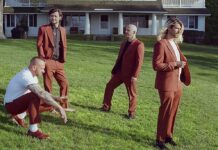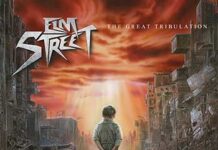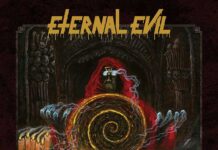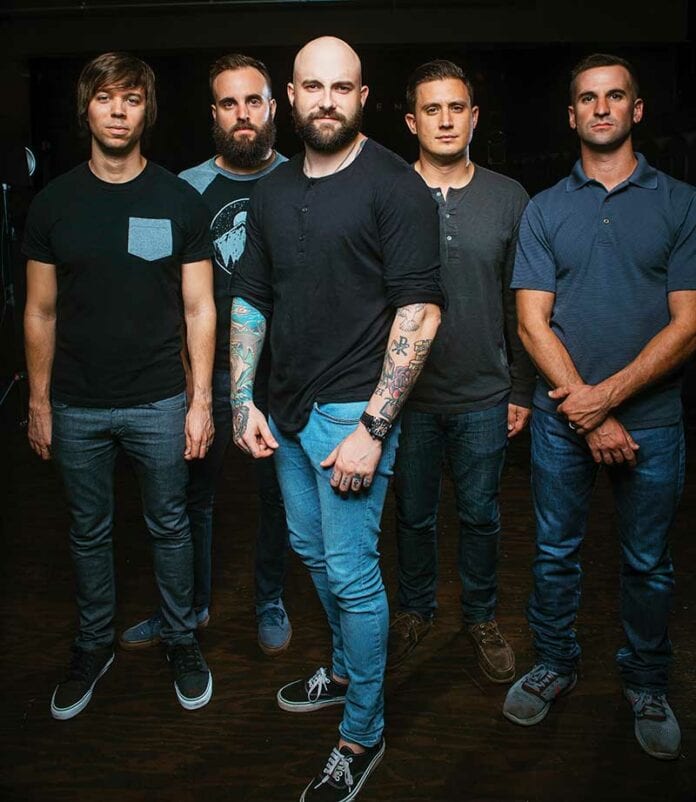
Interview with JB Brubaker by Dan Slessor
Photographs by Jeremy Saffer
With so many fads and trends coming and going in heavy music, it’s not always easy to keep your integrity and stick to your guns while maintaining a fan base. In August Burns Red’s case, this has never been a cause for concern. Remaining true to its core sound while progressing naturally with each record, the band has built up one of the most admirable catalogs in contemporary metalcore. With Phantom Anthem, their seventh full-length, they have preserved this ethos, showcasing a sound that is equal parts melody and muscle, shot through with a ton of emotion and bolstered by lyrics that avoid clichés. We caught up with guitarist JB Brubaker to talk about the new record, the progression of the band, and why you won’t hear August Burns Red selling out any time soon.
You’ve released a new full-length every two years like clockwork since 2005. Has that been an easy schedule to maintain, or does it take a lot of effort to keep to that cycle?
It’s actually been pretty organic for us. Some people might think it sounds difficult on the surface, but by the time our record is out, we completed writing for it six or nine months back already. During that time, we get a break from writing, and usually within a couple of months of the album coming out, we start to get the creative itch again and start writing in our downtime. It works out that by the time we have enough material ready for a new record, it lines us up to have that finished and out around two years after the last one.
How was the touring cycle on 2015’s Found in Far Away Places?
It was good. We had some awesome tours. We did two European festival runs, which is always really fun and something I enjoy being a part of, though unfortunately we didn’t do a proper European headlining run on that record. We did a support tour, and then came back and did the Messengers [2007] 10th anniversary tour, which maybe meant Found in Far Away Places didn’t all the way get its fair shake. The cycle felt a little short because of that anniversary thing, which kind of ate up all of 2017, but that tour was awesome, and we’re not disappointed that we went that route.
Did revisiting that record on tour influence the writing for Phantom Anthem?
That’s actually a question that’s been asked by fans quite a lot, who think Phantom Anthem is a throwback at times and sort of a return to our older sound. But, in all honesty, almost the entire record was written before we started doing that Messengers stuff, so it didn’t really play a part in that.
“WE ARE WHAT WE ARE AND WE HAVE OUR SOUND, AND WE’RE NOT TRYING TO GO OUT THERE AND REINVENT AUGUST BURNS RED.”
Going into Phantom Anthem, did you have an idea of the kind of record you wanted to make, or did it come together as you started writing for it?
One of the things I wanted to do with this record was to be a little bit less weird on the interlude side of things. Otherwise, it was very organic. I just wanted to let the songs flow out and feel how they felt. I wasn’t trying to push the super avant-garde side of us like I had a little bit with some of the stuff on Found in Far Away Places. I still wanted to write a lot of cool stuff, but I was more drawn to writing interesting and dynamic clean sections as a musician. I didn’t fall into the really crazy, outside of the box stuff, and there’s no Western section on Phantom Anthem, or Jewish sounding waltz parts (laughs). I think it’s also overall maybe a little bit more focused as an album than the one before it.
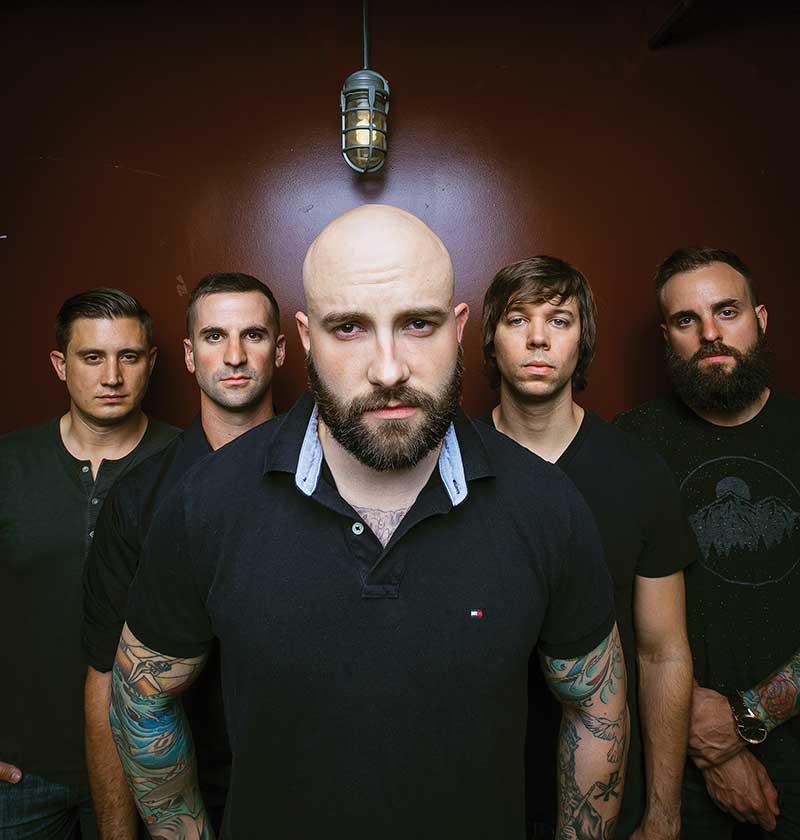
Do you always write the same way, or do you mix things up and try different things during that part of the process?
I haven’t changed my writing process at all, like ever. I’ve tweaked it, but it remains a case of sitting by myself in the basement and I play around with riffs until I get something cool. I have this old Windows guitar program that I’m really familiar with—having been using it for over a decade now—on this crappy Google Chromebook that’s dedicated entirely to that program. Once I have one riff down, I’ll try to build around it and see what happens.
With so many records now under your belt, do you ever come up with things and think, “Okay, that sounds a bit too much like this or that track,” or do you not tend to have that problem?
One thing we tend to hear in critiques from reviewers quite a lot is along the lines of, “This record rips, it’s classic August Burns Red, and a great metal record, but they didn’t really change their sound or formula at all.” That’s a little disheartening for us, because we are what we are and we have our sound, and we’re not trying to go out there and reinvent August Burns Red. We’re pretty happy with how we sound, and we enjoy tweaking, expanding, and experimenting with it, but we’re not going to write an arena rock record or go heavily electronic. I think our fans would be disappointed if we went away and came back sounding really different. We like our style of music and our little corner of metalcore, and when we’re writing, it still feels fresh to us, so we’re happy there.
That you do stick to your sound but every record has a personality of its own is something that not many bands manage these days. So many bands are trying to use synths, glitchy electronics, and taking inspiration from Bring Me the Horizon.
I think younger bands and those starting out right now like to jump on the flavor of the week, and Bring Me the Horizon is very much at the forefront of what they do, so it’s understandable that people might be influenced to follow in their footsteps. We’ve always just done our own thing, and it’s been a motivator to not do what everyone else is doing right now in metalcore music. Trends come and go pretty quickly, and then it’s on to the next one. Some bands come and go as a result, and it’s hard to build much of a career when you’re doing only what’s popular at that moment in time.
“WE’VE ALWAYS JUST DONE OUR OWN THING, AND IT’S BEEN A MOTIVATOR TO NOT DO WHAT EVERYONE ELSE IS DOING”
When do you present the rest of the band with the material you’ve been working on? Are the songs pretty much finished or still works in progress?
I only show them finished material, and I get my demos to a point that I’m really happy with them. I want to sell the band on a completed song so I can get them as excited about it as I am. If I’m not happy with something, I think it would be harder for the guys to envision what it is I’m trying to do. Fortunately, at this point no one’s ever rejected anything I’ve sent over to them. I’ve gotten lucky in that respect (laughs). Sometimes they’ll like one more than another, but I’ve never been told that a song sounds shitty.
Musically, there are a lot of passages that are really uplifting, breaking free of the heaviness. Were you trying to get an optimistic feel in there?
I think sometimes I am. One of the things we’ve done on Phantom Anthem that we haven’t done much in the past is playing in a major key. That definitely gives more of an uplifting sound, and that’s something I wanted to do before, but there was a little bit of conflict in the band in terms of getting too happy sounding. We even cut out a big section on a song on Rescue & Restore [2013] that I was really excited about, which was in a major key. Our singer Jake [Luhrs] said to me, “Dude, I don’t know what to do with this. It’s so happy and so random and is so completely out of place I’m not feeling it.” We ended up taking the riff and changing the notes to turn it into something minor, and I was disappointed, but I got over it. On this record, I was able to slip some of those happier sounding, uplifting sections on there, and I think it’s cool because it adds diversity. Not everything has to be minor, dark, and gritty. It gives it more of an ebb and flow and variety.
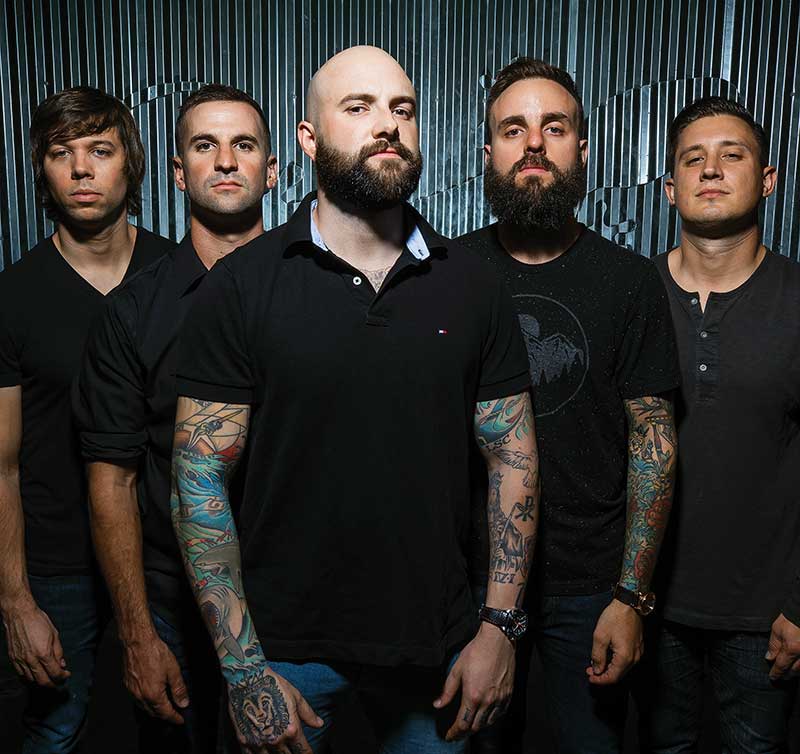
Do you spend a lot of time trying to get the songs in the exact running order to achieve the ebb and flow you mentioned?
It’s certainly something we think about, and it can be tricky from record to record. We didn’t have a terribly difficult time on this record, though to begin with I was pretty set on track four, which is “Lifeline,” as the closer. That was one of the songs our bass player Dustin [Davidson] wrote, and he was dead set on “Carbon Copy” as being the closer, which is another song that he wrote. Ultimately, we went with “Carbon Copy.” It wasn’t a deal breaker to me, just how I heard it, and it wasn’t like any of us were completely married to one order for the songs. Some of the guys don’t give it too much thought. They know Dustin and I will spend a lot of time thinking about it and do what we can to make it the best it can be. It’s important to not have all the most brutal songs in a row, but then being a metalcore band, there are a lot of brutal songs in there.
The interludes in the songs aren’t quite as out there, but the one on “Generations” is gorgeous and has some interesting instrumentation with slide guitar. Was that a section you worked hard on?
Yeah, and I love having a slide guitar lead in there because that’s always fun for me. You don’t get to play a lot of slide in our genre. I try to squeeze it in here and there when I can, and I used some MIDI sounds for other instruments. I like adding other cool touches like that. It adds a different sound and texture to things. When I’m writing the songs, once I have a section done, I’ll go back and see if there’s anything cool to fill it out. This is something I started doing when we did our Christmas record Sleddin’ Hill in 2012, which was when I discovered how cool pads and MIDI could be, and now it’s my favorite part of writing a record. It takes parts to the next level, and we’ve had a lot of pads and textural stuff since Sleddin’ Hill and Rescue & Restore. I think on this record we turned them up in the mix a little more and made them a little less subtle, which I like. There’s always a lot of back and forth with the producer over how high in the mix can you go without changing the vibe too much and ending up with a Bleeding Through song or something (laughs). Personally, I’m very happy with that element of the band, and it’s a lot of fun to experiment once the record’s crafted.
“THE SONGS ARE COMPLEX, AND IT TOOK A LITTLE MORE TIME TO GET IT JUST RIGHT, IN ALL ASPECTS.”
Are the strings on the record synths or actual instruments?
The strings are for the most part played. Our vocal producer Grant McFarland always plays cello on our records, and we have a violin player we’re buddies with who comes in and is so talented. On this last record, we used a plug-in on Pro Tools to make sheet music from the MIDI parts, and we gave him that. He took it to the booth and played it on the spot, which is awesome.
Are there any instruments on Phantom Anthem that you haven’t used before, or is it all stuff you’re familiar with?
We didn’t use anything weird or wacky this time, but there was definitely a ton of guitars, way more than we have in past. The process of finding the guitars we wanted to use for the clean parts and the right pick up and finding the exact tones was very time consuming, but it’s a lot of fun to experiment with all of that. I think there’s 10 guitars on there in total, which is a lot more than we use live.
August Burns Red is one of the few metalcore bands that has never gone big with clean vocals. Has there ever been the temptation to go that way?
I really don’t think it’s who we are. I feel like the new record has a lot of singing on it, compared to our old stuff, but it’s never a full-on clean part. There’s almost some screaming in the singing. I think that’s more in Jake’s wheelhouse than a clean chorus part, and we like being the band that doesn’t sing.
What subjects are being touched on in the lyrics of Phantom Anthem?
All kinds of stuff, there’s no underlying theme. Brent [Rambler, guitar] contributed the majority of the lyrics. and Matt [Greiner, drums] contributed a couple of songs, too. There’s a song about the state of America currently. I don’t want to get too political, but things are pretty hectic right now with our President, and it’s on a lot of people’s minds. There’s a song about the trouble going on in Africa with Boko Haram, the terrorist group that’s doing awful things on a greater scale than even ISIS. It’s something that gets ignored by the Western world because it’s not really affecting us, but it’s affecting a lot more people than ISIS, which is really sad. There’s also a song about taking care of the planet and what we have here for future generations. So, yeah, there’s a variety of subjects and themes on there.
Carson Slovak and Grant MacFarland have produced all of your records since 2012. Why do you choose to keep working with them?
We’re very comfortable with them, which is certainly a factor. We’re all grown adults and most of us have families now, and Carson and Grant work out of Lancaster, Pennsylvania, which is where we’re from. So, it’s very convenient, especially if we’ve been out on long tours. It sucks to come home and have to fly to LA for a month or two to make a record. When we’re at home, we can treat the recording process like a job. We can work it like a nine to five, which is a really nice way of doing it. After doing so many records together, we have a great rapport, they know how to get the best out of us, and they’re constantly improving what they’re doing on the production side of things. We’re really happy with the finished products they give us. It’s also nice to be involved with the mix. Before we worked with Carson and Grant, the mixing was done without any of us present, and that makes the process that much more tedious when we have to go through the songs and write out so many notes and send them to the mixer and hope they interpret it correctly. Then with all the back and forth, it’s time consuming. When you can just sit there with the guys mixing it and say, “Actually, I want that guitar line to have a bit more delay on it,” or, “That snare to come up a little bit,” it’s great to know you’ll get it the way you want it.
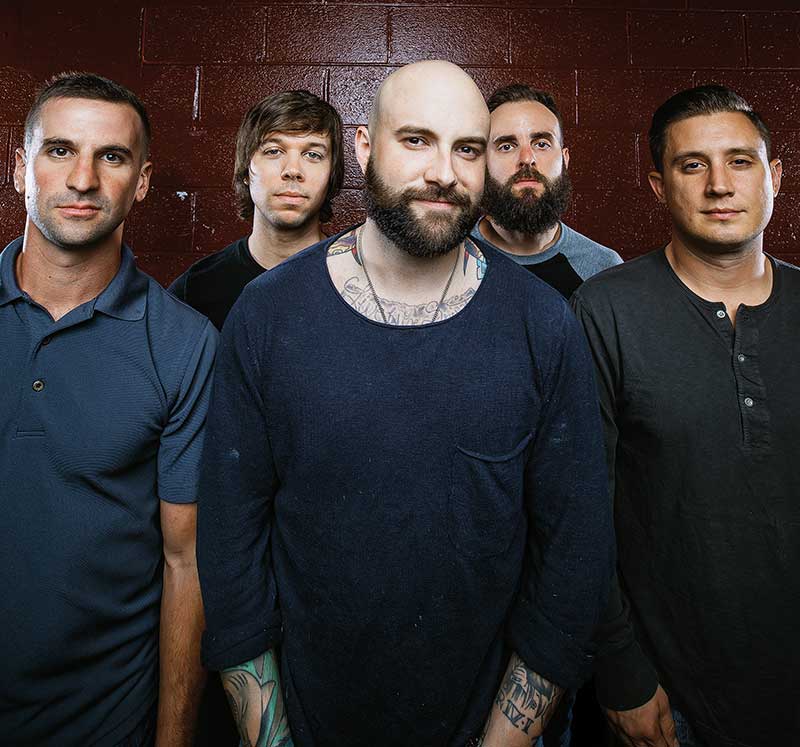
How was tracking the record overall?
It was actually one of the more difficult recording processes that we’ve had. I don’t have a great reason as to why that is. We had a lot of time for it. We took two whole months to track the record, which is more time than we’ve ever used. But, the songs are complex, and it took a little more time to get it just right, in all aspects. We actually started out with tracking guitars, which is something we’ve never done before, and that was the result of Matt getting food poisoning right before we were supposed to start. He was laid up for about a week and then had to get his strength back up, so we did all the guitars without any drums, and it took a couple of weeks just to track the rhythm parts. Like I was saying earlier, we also used a lot of different guitars and spent a lot of time on tones, and every clean tone on the record is different. There’s not one clean tone that we use throughout all of the clean sections, and when you get into the details and have the time, you’re going to get caught up in that. And I don’t know any band that finishes recording early. If you have the time carved out, you’re going to use all of it, because it gives you the opportunity to both focus and experiment, and we used all the time that we had. There were also a lot of difficult parts to play. It’s a long time to be spending in a windowless room eight hours a day, but it’s worth it in the end.
Do you ever get into the studio and find yourself thinking, “Why didn’t I write something easier than this?”
That’s more of an issue when I’ve got to play it live. In the studio you can make it happen, you can chop the part into smaller sections if you need to, and right now I’m working on learning to play a bunch of the new songs live. There are several parts where I’m like, “Why did I write this?” It’s a case of sitting down and just drilling the guitar parts, and I understand that you always have to practice things, but after doing this for so many years, it would be cool if I could just sit down and play them straight off. But we all have to work on them to keep our chops up. It’s part of the deal when you’re in a band like this.
Do you ever have any eureka moments while recording, where something happens out of nowhere and takes things in a direction you hadn’t previously thought of?
We do plan very carefully, but if we do get eureka moments, that tends to happen more in the vocals. That’s an element that gets written more on the spot, and on this record, Brent worked pretty closely with Jake in the vocal booth, alongside Grant who handles all the vocal production. They had this little three way powwow going most of the way throughout that part of the process. I think that’s cool, because bouncing ideas back and forth between them and trying different ideas was better than just having Grant and Jake together and then presenting the vocals to the band like they’ve done in the past. Brent has a good ear for what I think the rest of the band is looking for, and he could maybe nip an idea in the bud if he didn’t think everyone else would be feeling it, or reaffirm a part they might have been skeptical of. It was just nice to have more people involved from the get-go, and I think that made the vocals a bit easier at the back end.
Aside from the string players, there are no guests on Phantom Anthem. If you could have anyone guest on one of your records, who would be at the top of your list?
Well, I already got lucky in that my favorite guitar player—Paul Waggoner, from Between the Buried and Me—played a solo on Found in Far Away Places, and that was really cool for me. As far as a vocalist goes—and I think this would be a lot cooler for me more than the majority of our fan base—I would love to have Aaron Weiss from the band MewithoutYou come in and do a vocal. He has such a unique vocal style, and I think that would be really cool to have him lend that to a section that was geared to really suit him. They’re one of my favorite bands, and I think that could be awesome.
“WE GET THE GOAL OF WHAT WE’RE TRYING TO ACCOMPLISH, AND THAT TIES US TOGETHER.”
Phantom Anthem had a strong debut in its first week, but sold less than your previous record did in the same timeframe. Is that something that bothers you at all?
It’s an interesting situation. It bothers me in that everyone sees each other’s numbers and are so quick to say, “Well, it didn’t sell as many as the last one.” But everyone is selling less right now. It’s the way that albums are being consumed by listeners now. They’re not going out and buying albums, and our streams were way up higher on Phantom Anthem than they were for Found in Far Away Places. But, streaming counts for so little compared to an actual sale—you have to stream a song from an album 1,500 times for it to count as one SoundScan, or a 10 track album as a whole 150 times. That’s pretty absurd, because some of my favorite albums I don’t think I’ve listened to 150 times. I think on this level SoundScan needs to be recalibrated, but I can’t blame anyone for not going out and buying the record. I just sold all my CDs this year. I’d bought them for years and years, but they were taking up space and I’m not listening to them. I didn’t want to just throw them out, so I sold them to a record store. Hopefully, someone who wants them can find them, and I listen to all of my music on Apple Music now. I stream everything, and I haven’t bought an album in a long time, so I can’t blame anyone who doesn’t want to buy our CD, because the way we consume music has changed. I think that first week and how we look at those numbers has become antiquated, and doesn’t really reflect how your record has been accepted in that first week. The total number of streams is so much more significant now, and more and more people are subscribing to streaming services. I really think within a few more years CDs won’t even be pressed. They’ll be done.
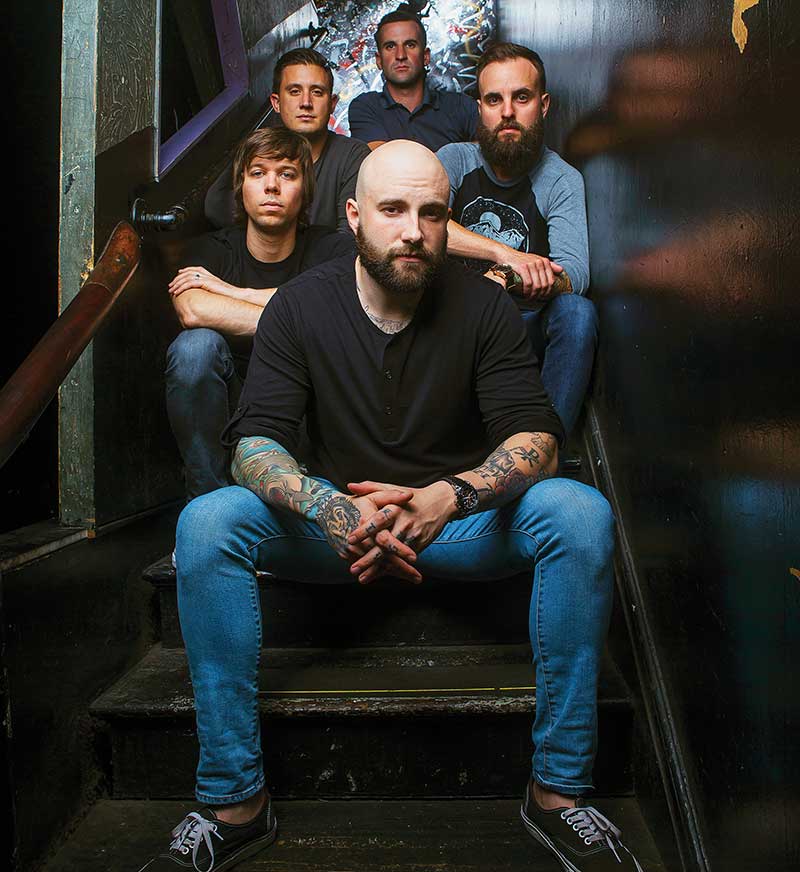
In terms of the level you’re at touring-wise and the size of venues you play, do you still have aspirations to play in bigger places, or are you content with where you’re at?
I’d always like to get into bigger venues, of course, but I think August Burns Red is what it is, as far as touring goes. We’ve been in similar room sizes for a while now, especially in North America, and I am happy with the places we get to play, in clubs and theaters with one or two thousand people. The rooms in Europe are smaller. It’s cool as well, just not quite as big, and if we could grow and get bigger, everyone would love that, I’m sure, but it’s not like we’re sad about our current level.
And do you make enough off the band to survive when you’re not on the road?
Yeah, we all do, which is something that we are really happy about and really appreciate. Anything done on the side is more like an outlet. Jake works with a nonprofit, Matt teaches drum lessons and is the kind of guy who has to keep himself busy. He can’t come home from touring and just chill, and he works on his parents’ farm a lot. I’m super busy at home. Brent and I manage the band, and there’s always lots of stuff to be done and tons of planning. I have my hands in every facet of August Burns Red, so even when I’m not on tour, there’s lots to do with this band. I really enjoy that. I love the business side of managing. It’s fun for me.
You’ve maintained the same lineup for 12 years, which is impressive these days. How do you keep making it work?
Wow, 12 years does sound long (laughs). I don’t know if I have a great answer for how we keep it together. We have a good understanding of one another, we have a good understanding of the common goal for August Burns Red, and everyone knows what to expect at this point. While we have our internal conflicts from time to time and our petty differences—especially on the road when we’re living on the bus in close quarters—we get the goal of what we’re trying to accomplish, and that ties us together. We also know that when times get tough and we’re going through a rough patch internally, that life on the other side of August Burns Red is going to be way harder and way shittier than what we have right now. When you’re in a band as your job, that’s a gift, that’s something that a lot of people dream about and don’t get to achieve. We all know that even at its worst, this is still way better than being sequestered in a cubicle or hanging drywall. Those are the life after the metal band kind of careers that we’d be looking at, so we’re able to set our differences aside, added to which we’re able to communicate with each other. If something is bothering someone, we usually confront it, we’re not all super passive-aggressive, and if you want to keep a relationship intact, we know that being able to speak to each other with respect and with the intent of resolving whatever is wrong is important.
This is a question very few musicians can answer, but do you have a favorite amongst the records you’ve released up until now?
Yeah, that is difficult to answer, because partly you’re always highest on what you’ve done most recently. I’m obviously very high on Phantom Anthem right now, and if I can take that out of the equation and look back, even then this is going to be a cop out because I really like Found in Far Away Places and I really like Rescue & Restore, our previous two records. But I really do find I like each of our records a little bit more than our previous one. I know our fans don’t feel that way, and I get that. I look at other bands that have large discographies. Take Death Cab for Cutie, for instance. I love that band and they have a ton of records, but my favorite isn’t their latest. I like their latest, it’s a great record, and I totally understand people might have the same reaction, saying they like Phantom Anthem, but it isn’t their favorite, and that’s fine.
Rescue & Restore and the two records that have followed feel like you have come into a new era of the band, where you have really nailed down the modern August Burns Red sound.
I’m so glad you feel that way, and I completely agree. With Rescue & Restore, we turned the corner a little bit, and we got more—I don’t want to say “progressive,” because we’re not a progressive band, and I wouldn’t want to call us that, but there’s more variety. To me, Constellations [2009] feels like a thrash album with breakdowns, Messengers is a metal album with non-stop breakdowns, which is just dark and heavy, and I don’t even know what Leveler [2011] is. I feel like that’s our forgotten record, the one in between the classics before we found our modern sound. I can definitely compartmentalize our catalog in my mind, and I think we really discovered what we really wanted to be with Rescue & Restore.
What does 2018 look like for August Burns Red? Is there a lot of touring on the horizon?
Yeah, it’s going to be a lot of touring, much heavier than 2017. Already we have several weeks headlining in North America, and we come home for 10 days before doing Europe with Heaven Shall Burn. We have a lot of stuff that we’re planning. We’re going to be hitting it hard. We’re really proud of Phantom Anthem, and we want to do it justice and tour it hard, and get it in people’s faces as much as possible.









